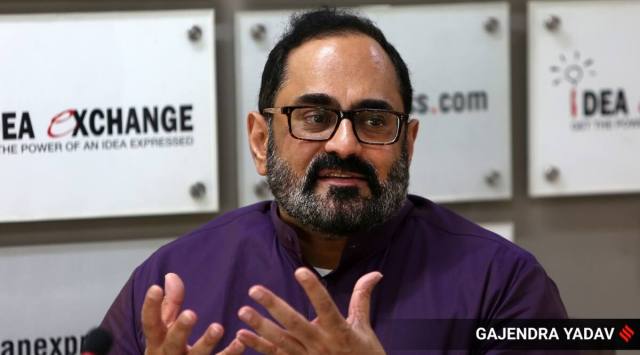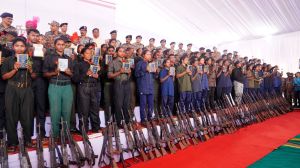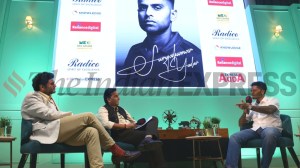Rajeev Chandrasekhar, Electronics & IT Minister, is Adda guest today
At the Adda, Chandrasekhar will be in conversation with Anant Goenka, Executive Director, Indian Express Group, and Anil Sasi, National Business Editor, The Indian Express.
 Rajeev Chandrasekhar
Rajeev Chandrasekhar AS THE Union Minister of State for Electronics and IT and Skill Development and Entrepreneurship, Rajeev Chandrasekhar is in a unique position to devise policies and programmes that could leverage the increasing convergence between the tech sector and the cogent need for upskilling the workforce.
With India looking to set itself up as a semiconductor and electronics hub, there is a pivotal need to have a skilled workforce, and with new age technologies like AI posing a potential threat to human jobs, relevant skills for the online space for workers will be a key challenge in the years to come.
A technocrat whose professional career involved successful stints at BPL and Intel, Chandrasekhar will be the chief guest at the Express Adda on Wednesday. His two portfolios are important electoral pitches for the Bharatiya Janata Party-led Central government ahead of the 2024 general elections.
At the Adda, Chandrasekhar will be in conversation with Anant Goenka, Executive Director, Indian Express Group, and Anil Sasi, National Business Editor, The Indian Express.
Known to be one of the most informed voices about various issues on digitisation, Chandrasekhar has been vocal about matters involving regulatory policy, consumer rights in cyberspace, spectrum allocation, net neutrality, and the impact of AI on India’s job market. In IT, he has been instrumental in rolling out a $10-billion incentive package to kickstart semiconductor production in India. Once up and running, these fabs could play a major role in increasing India’s local production capacity significantly while cutting down the reliance on semiconductor imports from elsewhere.
#ExpressAdda | With the Digital Personal Data Protection Bill expected in #Parliament in a few weeks, there’s a lot to talk about with Rajeev Chandrasekhar (@Rajeev_GoI).
Watch here 👉 https://t.co/HR9kdLRF6c
Join Indian Express’ @anantgoenka and @sasi_anil in conversation with… pic.twitter.com/hnm1GRLkKr
— The Indian Express (@IndianExpress) July 18, 2023
He is also a key figure in formulating the Digital India Bill that will replace the decades-old Information Technology Act, 2000, and is expected to fundamentally change some of the long-held beliefs about Internet platforms, especially social media companies and how they conduct themselves in cyberspace. In his role as the Minister of State for Skill Development and Entrepreneurship, he has been pushing for transparency in Public Assets management.
As a member of the Joint Committee on the Data Protection Bill, 2019, he had played a key role in the precursor to India’s draft data protection Bill that has received Cabinet nod and is headed to Parliament’s monsoon session.
Even before he was appointed as the MoS for Electronics and IT, Chandrasekhar had played a key part in shaping some of the most influential technology-related regulations in India. As an independent MP in 2013, he filed a PIL arguing that Section 66A of the Information Technology Act, 2000 was unconstitutional. In a landmark judgement in 2015, the Supreme Court struck down the provision. He was also one of the petitioners in the privacy case at the Supreme Court in 2017 when right to privacy was declared as a fundamental right.
Ahead of the 2014 Lok Sabha elections, Chandrasekhar was instrumental in pushing for electoral rights for Armed Forces personnel in their place of posting as well as the subsequent availability of the e-postal ballot facility to the Armed Forces.
Previous guests at the Adda include Union Minister of External Affairs S Jaishankar, Union Minister of Road Transport and Highways and MSMEs Nitin Gadkari, Union Minister of Health Mansukh Mandaviya, Union Minister of Housing and Urban Affairs and Petroleum and Natural Gas Hardeep Singh Puri, election strategist Prashant Kishor and oncologist and author Siddhartha Mukherjee.







